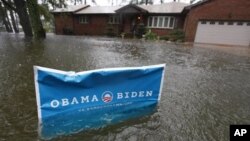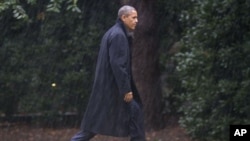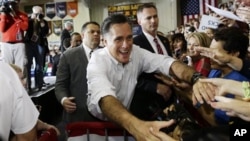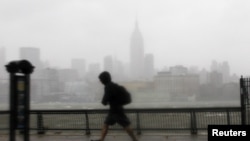Hurricane Sandy is forcing a temporary halt in campaigning for next week’s U.S. presidential election. Both President Barack Obama and Republican candidate Mitt Romney have cancelled campaign events through Tuesday as much of the East Coast of the United States prepares to deal with the impact of Sandy.
President Obama skipped a campaign rally in Florida to return to Washington to oversee emergency response efforts to deal with Hurricane Sandy.
“The election will take care of itself next week. Right now our number one priority is to make sure that we are saving lives," he said.
The Romney campaign quickly followed suit by canceling planned events through Tuesday as well.
Romney expressed concern about those in the path of the storm during a campaign rally in Ohio Sunday. “I know that right now some people in the country are a little nervous about a storm about to hit the coast and our thoughts and prayers are with the people who will find themselves in harm’s way," he said.
Even though President Obama did not make the Florida rally Monday, former President Bill Clinton was there to urge Democrats to get out and vote early.
“I say let’s give the job to the man who has done the job so he can finish the job," he said.
More than 30 states allow some form of early voting and Obama campaign officials insist they are building an early advantage in some key states where the outcome on Election Day is in doubt.
Senior Obama campaign strategist David Axelrod briefed reporters in a conference call. “We are winning this race. We base it on cold hard data based on who’s voted so far and on state by state polling," he said.
Public opinion polls suggest 41 of the 50 states lean strongly toward one candidate or the other. That leaves nine so-called swing states where both campaigns are spending most of their time and money urging supporters to get out and vote.
U.S. presidential elections are won by winning the state-by-state electoral vote tallies. Each state has a certain number of electoral votes based on population. In most cases the winner of the popular vote in a given state is awarded all of that state’s electoral votes. There is a total of 538 electoral votes and the winning candidate must secure a minimum of 270 electoral votes.
Obama campaign manager Jim Messina told reporters that a strong Democratic turnout now under way in the early voting in many states will help the president win a second term next Tuesday. “And in states like Iowa and Nevada we are racking up early vote margins so large that, if they continue at this rate, Romney is going to have to win a huge percentage on Election Day and he is just not going to be able to mathematically get there," he said.
But conservative analyst Scot Faulkner tells VOA that Romney has been surging in the polls ever since his first debate with President Obama on October 3.
“I think it is Romney’s to lose. I think he has momentum from the first debate and that first impression has spilled over into the other two debates. He is within the margin of error [close in the polls] in a lot of the swing states and he’s got the momentum, so we’ll see if that continues," he said.
Gallup pollster Frank Newport says a record number of early voters are expected in this year’s election campaign. “One thing this year in the United States is that we have a lot of early voting, people vote early. Now in fact some estimates by experts are that 40 percent of votes will be early - that is, cast before Election Day by mail or absentee ballot," he said.
It remains to be seen to what extent the hurricane will disrupt early voting in some states. In addition, some state officials worry that power outages in the wake of the storm could have an impact on voting next week.
With one week to go until Election Day, most polls continue to show a very close race both in the national ballot and in several of the so-called battleground states where the election will be decided.
President Obama skipped a campaign rally in Florida to return to Washington to oversee emergency response efforts to deal with Hurricane Sandy.
“The election will take care of itself next week. Right now our number one priority is to make sure that we are saving lives," he said.
The Romney campaign quickly followed suit by canceling planned events through Tuesday as well.
Romney expressed concern about those in the path of the storm during a campaign rally in Ohio Sunday. “I know that right now some people in the country are a little nervous about a storm about to hit the coast and our thoughts and prayers are with the people who will find themselves in harm’s way," he said.
Even though President Obama did not make the Florida rally Monday, former President Bill Clinton was there to urge Democrats to get out and vote early.
“I say let’s give the job to the man who has done the job so he can finish the job," he said.
More than 30 states allow some form of early voting and Obama campaign officials insist they are building an early advantage in some key states where the outcome on Election Day is in doubt.
Senior Obama campaign strategist David Axelrod briefed reporters in a conference call. “We are winning this race. We base it on cold hard data based on who’s voted so far and on state by state polling," he said.
Public opinion polls suggest 41 of the 50 states lean strongly toward one candidate or the other. That leaves nine so-called swing states where both campaigns are spending most of their time and money urging supporters to get out and vote.
U.S. presidential elections are won by winning the state-by-state electoral vote tallies. Each state has a certain number of electoral votes based on population. In most cases the winner of the popular vote in a given state is awarded all of that state’s electoral votes. There is a total of 538 electoral votes and the winning candidate must secure a minimum of 270 electoral votes.
Obama campaign manager Jim Messina told reporters that a strong Democratic turnout now under way in the early voting in many states will help the president win a second term next Tuesday. “And in states like Iowa and Nevada we are racking up early vote margins so large that, if they continue at this rate, Romney is going to have to win a huge percentage on Election Day and he is just not going to be able to mathematically get there," he said.
But conservative analyst Scot Faulkner tells VOA that Romney has been surging in the polls ever since his first debate with President Obama on October 3.
“I think it is Romney’s to lose. I think he has momentum from the first debate and that first impression has spilled over into the other two debates. He is within the margin of error [close in the polls] in a lot of the swing states and he’s got the momentum, so we’ll see if that continues," he said.
Gallup pollster Frank Newport says a record number of early voters are expected in this year’s election campaign. “One thing this year in the United States is that we have a lot of early voting, people vote early. Now in fact some estimates by experts are that 40 percent of votes will be early - that is, cast before Election Day by mail or absentee ballot," he said.
It remains to be seen to what extent the hurricane will disrupt early voting in some states. In addition, some state officials worry that power outages in the wake of the storm could have an impact on voting next week.
With one week to go until Election Day, most polls continue to show a very close race both in the national ballot and in several of the so-called battleground states where the election will be decided.








